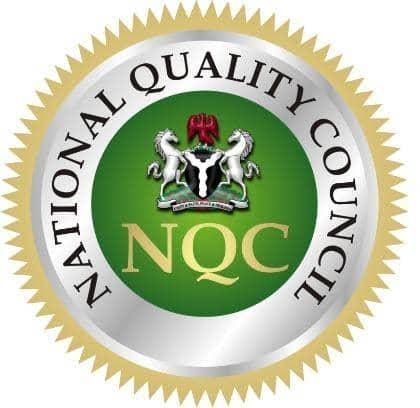By Ekuson Nw’Ogbunka
Abuja
The National Quality Council (NQC) has been leveraging on collaborations with different sets of stakeholders as part of efforts to kickstart the implementation of the approved Nigerian National Quality Policy (NNQP) document, according to its Chairman/Chief Executive, Mr. Osita Aboloma on Sunday.
These collaborative efforts he said, are in the council’s quest to generally drive quality related issues in the overall interest of the rapid economic development of Nigeria; through the promotion of non-oil export, mitigation of Nigeria’s export rejects and the optimization of the Country’s gains from the African Continental Free Trade Area (AfCFTA) Agreement among other initiatives.
Among such stakeholders are the African Union Commission/Pan African Quality Infrastructure in the successful hosting of the maiden African Cassava Conference (ACC) in Nigeria, the United Kingdom High Commission, Abuja/British Standards Institute under the Standards Partnership Programme; and the ongoing Business Round Table in conjunction with the Nigeria Agribusiness Group (NABG), among others, he said.
According to Aboloma, the NQC undertook the Chairmanship of the Local Organising Committee (LOC) for the ACC in Nigeria to among others mobilize relevant agencies of government at the Federal and State levels as well as members of the organized private sector in agriculture and allied fields, development partners, Research Institutions and the mass media to drive the successful hosting of the Conference in Nigeria.
Aboloma said other objectives included to ensure active participation of stakeholders in Nigeria and to leverage the huge production capacity of the Nation to promote quality along the Cassava value chain for food sufficiency, food security and increased foreign exchange earnings especially in view of the African Continental Free Trade Area Agreement implementation.
The ACC which according to him was a huge success, provided Nigeria a unique opportunity to host and rub minds with stakeholders in Cassava and its derivates from across the African continent, project the huge benefits derivable from further developing the Cassava value chain and provided an opportunity for a review of policies relating to the crop and the implementation in Nigeria.
It also provided opportunity for stakeholders in research to exchange ideas towards harmonizing views for enhanced development of the Cassava Value Chain in the entire continent.
The NQC presented the keynote paper at the opening of the Conference titled “The Role of National Governments and Quality Infrastructure Institutions in the Development of the Cassava Value Chain” said Mr. Aboloma.
On the UK funded Standards Partnership Programme being implemented in collaboration with the British Standards Institute, he stated that the NQC is the focal point for the implementation which involves sister agencies like the Standards Organisation of Nigeria (SON), NAFDAC, Nigerian Export Promotion Council (NEPC), Nigerian Investment Promotion Commission (NIPC), National Plant and Animal Quarantine Services.
Others were the Organised Private Sector Groups, including, Nigerian National Accreditation Service (NiNAS), Manufacturers Association of Nigeria (MAN), NACCIMA, NASME, NASSI, Nigerian Agribusiness Group (NABG) etc.
Aboloma enumerated the first set of components of the Standards Partnership Programme as including:
Sensitization of the role of the policy in making the QI more efficient and focused within Government and Key stakeholders; the completion of the NNQP Implementation Strategy Matrix based on the key sectors identified by the NEPC; developing and implementing a NQP communications strategy as part of launching and promoting the role of the NQP, especially within the private sector; providing appropriate professional and technical training, mentoring and skills transfer for the QI institutions and related conformity assessment bodies, using a market needs driven approach; and
the developing best practice technical regulations through the use of regulatory impact assessment (RIA) and good regulatory practices.
Aboloma disclosed that deliverables already accomplished under the Standards Partnership Programme include: a Nigerian National Quality Policy workshop for public sector stakeholders held at the Abuja Continental Hotel with participants from NQC, SON, NAFDAC, NiNAS, NEPC, NAQS, FCCPC, BSI and FCDO amongst others in November, 2023.
A Nigerian National Quality Policy workshop for private sector stakeholders also held at the Abuja Continental Hotel in December, 2023 and
Another NNQP workshop for private sector stakeholders held at the Sheraton Hotels, Lagos in March 2024.
The second leg of the programme is set to commence in July, 2024 according to the NQC Chairman.
Expounding on the collaboration with Nigerian Agribusiness Group (NABG), Mr. Aboloma described the maiden Round Table discussion on the implementation framework of the Nigerian National Quality Policy document as sector specific as it is focusing on the agricultural sector.
Stakeholders expected at the event scheduled for July 16, 2024 in Abuja, according to him include from the public and private sectors as well as development partners, stressing that more of such sector specific engagements are to be expected in the near future.
The NQC participated actively at the NABG organized Agro Commodities National Validation programme held in Abuja in March 2024, he said.
He reiterated that the NNQP is to guide the development and effective implementation of the National Quality Infrastructure (NQI) consisting of the following pillars: harmonising standards and implementing, facilitating regional, continental and international trade
metrology, the science of measurement and accuracy; scientific, industrial and legal for certainty in trade across regional, continental and international boundaries.
Accreditation (external recognition of adherence to a set of international standards to perform activity or hold a certain status thus conferring global acceptance)
Conformity Assessment services (inspection, testing and products/systems certification) to guarantee that products tested in Nigeria will be acceptable across its borders, beyond the West Africa Region, the entire African Continent as well as globally,
The NQC Chairman stressed that the Council is poised to work seamlessly with all Stakeholders including public and private sector organisations as well as institutions housing the National Quality Infrastructure in Nigeria, development partners and multi-lateral institutions, to promote and enhance efficiency and effectiveness aimed at rapid economic growth via improved competitiveness of made in Nigeria products and services.











